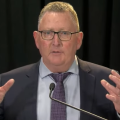|
Location: IMF Connect
 |
Adrian Orr Governor of the Reserve Bank of New Zealand
|
Adrian Orr is the Governor of the Reserve Bank of New Zealand. He was appointed in March 2018.
Adrian is a 1983 undergraduate of the University of Waikato (New Zealand) and a 1985 Masters graduate (with Distinction) from the University of Leicester (England).
Following his Masters, Adrian remained in the United Kingdom for three years working as a Research Associate and tutor at the City University Business School, in London.
Adrian returned to New Zealand in 1988 to take up the position of Research Economist at the New Zealand Institute of Economic Research before joining the Economics team at the National Bank of New Zealand the following year.
In 1992 Adrian moved to France to work as an economist at the Organisation for Economic Cooperation and Development (OECD).
After holding this role for three years, Adrian returned to New Zealand and worked for a short time as a Chief Analyst at The Treasury, before returning to the National Bank as Chief Economist.
Adrian was appointed Chief Manager of the economics team at the Reserve Bank of New Zealand in 1997, providing core economic and policy advice to the Governor.
Between 2000 and 2003 he served as Chief Economist for Westpac Banking Corporation.
This was followed by a four year stint as Deputy Governor and Head of Financial Stability of the Reserve Bank through to 2007.
From 2007 until his appointment as Governor, Adrian held the position of Chief Executive Officer at the Guardians of the New Zealand Superannuation Fund. The Fund has won a variety of international awards for investment, responsible investing, and leadership.
 |
Anne-Marie Gulde-Wolf Acting Director of the Asia and Pacific Department, IMF
|
Ms. Anne-Marie Gulde-Wolf, a German National, is the Acting Director of the IMF’s Asia and Pacific Department (APD). She is directly overseeing the department’s work and policy priorities on South Asian countries (India, Bangladesh, Bhutan, Nepal, Maldives, and Sri Lanka) and on several East Asian countries (Cambodia, Lao PDR, Myanmar, Thailand, and Vietnam), as well as the department’s work on financial sector issues. Before joining APD in 2019, she was Deputy Director in the African and earlier in the European Department, and previously held a Division Chief position in the Monetary and Capital Markets Department.
Ms. Gulde-Wolf studied Economics, Political Science, and History in Tuebingen, (Germany), St. Louis (USA), and Kiel (Germany) and holds a PhD in international economics from the Graduate Institute of International Studies in Geneva (Switzerland). She has published widely on different topics in international economics, with a focus on exchange rate regimes, currency boards, and financial stability and development issues.
Key Points:
Quotes:
“Central banks have to meet a low and stable inflation and contribute to employment mandates in the context of a high, evolving, severe health shock to the global economy, exacerbated by the Russian invasion of Ukraine.” Adrian Orr
“The way that we have being thinking about monetary policy in the Reserve Bank of New Zealand is being a ‘least regret framework’. We forget that back in 2020 we were in a very low and stable inflation environment and our biggest concerns were deflation and effective zero bound interest rates. So, which regret would central banks want to avoid? And deflation outweighs inflation.” Adrian Orr
“It is a balancing act – it is about forward guidance, acting deliberately, and using very plain language to explain what we are about.” Adrian Orr
“In the context of a strong recovery that has coincided with a rapid increase in inflation, real interest rates in many advanced economies are at historically low and very negative levels. Now, the spike in commodity prices related to the Ukraine war will add to inflationary pressures.” Anne-Marie Gulde-Wolf
Contributor: Daniela Alcantara